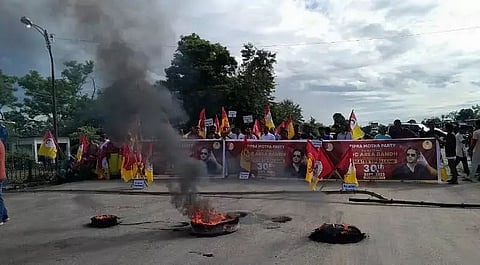
- Home
- Live Blog
- Breaking News
- Top Headlines
- Cities
- NE News
- Sentinel Media
- Sports
- Education
- Jobs

AGARTALA: In a significant development, the Tripura Tribal Areas Autonomous District Council (TTAADC) came to a standstill when the main opposition party, Tipra Motha, called for a 12-hour bandh. The objective was clear: to demand a constitutional solution for the indigenous people of Tripura.
The impact of this bandh was far-reaching, with businesses shutting their doors, public transportation services suspended, and the streets unusually quiet. Despite the disruption, the Tripura Police mobilized a substantial number of personnel to ensure peace and security, resulting in no reports of violence during the bandh.
The state government, in response, issued a directive for all offices within the district council to function normally on the day of the bandh. This move aimed to maintain administrative stability despite the protest's effect on daily life in the region.
Tipra Motha strategically orchestrated this bandh to exert pressure on the Government of India. Their goal? To address the long-standing concerns of indigenous communities in Tripura, who have often been marginalized and overlooked.
The success of the bandh lay not in chaos but in its ability to amplify the demands of the indigenous people and send a clear message to the central government. By bringing daily life to a temporary halt, Tipra Motha effectively conveyed the urgency of addressing the constitutional issues faced by the indigenous communities in Tripura.
The Tipra Motha-led bandh had a profound impact on the TTAADC. With most people choosing to stay home and businesses remaining closed, the district council was effectively paralyzed for the day. This display of unity and solidarity was a testament to the indigenous people's commitment to their cause.
Meanwhile, the Tripura government, while respecting the right to protest, was keen on ensuring that essential services continued uninterrupted. They directed all offices within the district council to operate as usual, demonstrating their commitment to administrative stability even in the face of a significant protest.
In addition, the government entrusted the Director General of Police with the responsibility of maintaining law and order during the bandh. This move demonstrated a balanced approach, recognizing the right to protest while also ensuring the safety and security of all citizens.
By temporarily disrupting daily life in the TTAADC, they sought to draw the attention of the Government of India to the urgent need for a constitutional remedy for the indigenous people of Tripura. This well-executed protest not only highlighted their demands but also conveyed a powerful message to the central government.
In conclusion, the 12-hour bandh organized by Tipra Motha made waves in Tripura by bringing life in the TTAADC to a standstill. While there were no reports of violence, the protest successfully emphasized the indigenous people's demands and exerted pressure on the central government to address their long-standing concerns. This strategic move underscored the unity and determination of Tripura's indigenous communities in their pursuit of a constitutional solution to their issues.
ALSO WATCH: